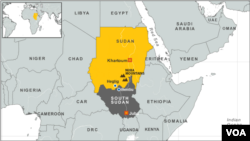ADDIS ABABA - South Sudan's chief peace negotiator has accused Sudan of bad faith as the two countries sit down for direct talks on security issues.
An air of mistrust hung over the luxury hotel where the two Sudans began their first high-level direct talks since border clashes drew them to the brink of war seven weeks ago. Defense and interior ministers from the two countries were on hand for the talks, which focused on critical security issues.
The negotiations are being held under threats of United Nations Security Council sanctions. Diplomats, observers and mediators said privately the atmosphere is no better than during the previous round of talks that failed in April.
As the meetings began, chief South Sudanese negotiator Pagan Amum accused Khartoum of lying about the U.N.-mandated withdrawal of all its forces from the disputed Abyei region. Amum said Sudan still has two battalions of heavily armed troops in Abyei, masquerading as police, guarding a strategic oil installation.
"Definitely they are not negotiating in good faith because you can see, they attempted to deceive the African Union and the United Nations that they have withdrawn their forces, only that they have done it partially," Amum said. "That was a clear indication of a lack of good faith."
Amum said South Sudan is committed to continuing the talks in keeping with the demands of the international community. But he said he sees little chance of progress in the current environment.
"We have agreed to talk without conditions. As we have been asked by the United Nations and the African Union, as we have been asked to talk without precondition," said Amum.
Q: "But the prospects for the talks must be nothing?"
A: "We have to come here to talk so we reach agreement and we are here, while talking, calling on Sudan to respect the U.N. Security Council resolution, to implement it, to stop aerial bombardment, stop attacking South Sudan, cease hostilities and talk in good faith."
Khartoum's negotiators declined interview requests, but spokesman Omer Dahab told reporters Sudan is complying with all United Nations and African Union orders to pull back its forces.
Asked whether he can say Sudan has pulled all of its police and other personnel out of Abyei, Dahab replied, "Yes, I can say that."
It was not immediately clear whether the presence of "oil police" would be viewed as a violation of U.N. and AU demands for a full withdrawal from Abyei.
African Union Commission Chairman Jean Ping issued a statement Saturday welcoming the redeployment of Sudanese troops and police from the disputed region. The statement called for an urgent meeting of a joint security oversight committee made up of representatives from both sides to address the question of the oil police.
A member of the AU mediation panel led by former South African president Thabo Mbeki confirmed that the oversight committee is due to meet Thursday.
An air of mistrust hung over the luxury hotel where the two Sudans began their first high-level direct talks since border clashes drew them to the brink of war seven weeks ago. Defense and interior ministers from the two countries were on hand for the talks, which focused on critical security issues.
The negotiations are being held under threats of United Nations Security Council sanctions. Diplomats, observers and mediators said privately the atmosphere is no better than during the previous round of talks that failed in April.
As the meetings began, chief South Sudanese negotiator Pagan Amum accused Khartoum of lying about the U.N.-mandated withdrawal of all its forces from the disputed Abyei region. Amum said Sudan still has two battalions of heavily armed troops in Abyei, masquerading as police, guarding a strategic oil installation.
"Definitely they are not negotiating in good faith because you can see, they attempted to deceive the African Union and the United Nations that they have withdrawn their forces, only that they have done it partially," Amum said. "That was a clear indication of a lack of good faith."
Amum said South Sudan is committed to continuing the talks in keeping with the demands of the international community. But he said he sees little chance of progress in the current environment.
"We have agreed to talk without conditions. As we have been asked by the United Nations and the African Union, as we have been asked to talk without precondition," said Amum.
Q: "But the prospects for the talks must be nothing?"
A: "We have to come here to talk so we reach agreement and we are here, while talking, calling on Sudan to respect the U.N. Security Council resolution, to implement it, to stop aerial bombardment, stop attacking South Sudan, cease hostilities and talk in good faith."
Khartoum's negotiators declined interview requests, but spokesman Omer Dahab told reporters Sudan is complying with all United Nations and African Union orders to pull back its forces.
Asked whether he can say Sudan has pulled all of its police and other personnel out of Abyei, Dahab replied, "Yes, I can say that."
It was not immediately clear whether the presence of "oil police" would be viewed as a violation of U.N. and AU demands for a full withdrawal from Abyei.
African Union Commission Chairman Jean Ping issued a statement Saturday welcoming the redeployment of Sudanese troops and police from the disputed region. The statement called for an urgent meeting of a joint security oversight committee made up of representatives from both sides to address the question of the oil police.
A member of the AU mediation panel led by former South African president Thabo Mbeki confirmed that the oversight committee is due to meet Thursday.





